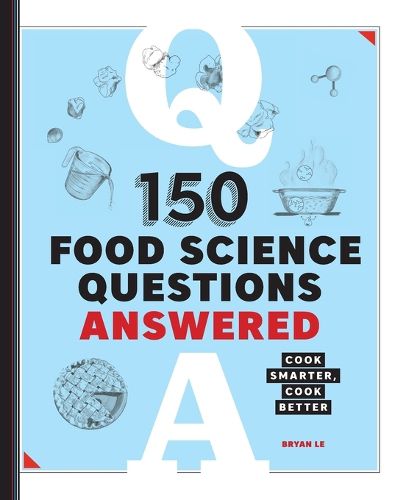Readings Newsletter
Become a Readings Member to make your shopping experience even easier.
Sign in or sign up for free!
You’re not far away from qualifying for FREE standard shipping within Australia
You’ve qualified for FREE standard shipping within Australia
The cart is loading…






Cooking isn’t just an art, it’s a science–150 fascinating food facts to make you a better cook
Does cold water come to a boil faster than warm water? Why does fat taste so good? What makes popcorn pop? Most of the processes that occur during cooking are based on principles found in biology, chemistry, and physics. 150 Food Science Questions Answered is an intriguing look into the science of food, from the eyes of a food science Ph.D. candidate and recipient of the James Beard Legacy Scholarship.
Learn food science–how controlling heat, moisture, acidity, and salt content can magically transform the way flavors are developed and perceived. Understand the food science behind the few hundred milliseconds that creates our sense of taste. With increased knowledge will come increased mastery, no matter what you’re cooking.
Inside 150 Food Science Questions Answered you’ll find:
Can you control garlic’s intensity by the way you cut it?–Garlic’s signature burn is released when its cell walls are cut into. Whole garlic will impart mild flavor; garlic crushed into a paste will deliver the strongest punch.
Does alcohol burn off when cooked?–Quick processes like flambe eliminate only about 25% of alcohol, while long-simmering can remove almost all of it.
Does searing a steak seal in the juices?–No, but it does develop delicious flavors through a process called the Maillard reaction.
Learn food science and you’ll be on your way to truly understanding the chemistry of cooking.
$9.00 standard shipping within Australia
FREE standard shipping within Australia for orders over $100.00
Express & International shipping calculated at checkout
Cooking isn’t just an art, it’s a science–150 fascinating food facts to make you a better cook
Does cold water come to a boil faster than warm water? Why does fat taste so good? What makes popcorn pop? Most of the processes that occur during cooking are based on principles found in biology, chemistry, and physics. 150 Food Science Questions Answered is an intriguing look into the science of food, from the eyes of a food science Ph.D. candidate and recipient of the James Beard Legacy Scholarship.
Learn food science–how controlling heat, moisture, acidity, and salt content can magically transform the way flavors are developed and perceived. Understand the food science behind the few hundred milliseconds that creates our sense of taste. With increased knowledge will come increased mastery, no matter what you’re cooking.
Inside 150 Food Science Questions Answered you’ll find:
Can you control garlic’s intensity by the way you cut it?–Garlic’s signature burn is released when its cell walls are cut into. Whole garlic will impart mild flavor; garlic crushed into a paste will deliver the strongest punch.
Does alcohol burn off when cooked?–Quick processes like flambe eliminate only about 25% of alcohol, while long-simmering can remove almost all of it.
Does searing a steak seal in the juices?–No, but it does develop delicious flavors through a process called the Maillard reaction.
Learn food science and you’ll be on your way to truly understanding the chemistry of cooking.